- Home
- »
- Medical Devices
- »
-
Aquatic Ecotoxicological Studies Market Size Report, 2030GVR Report cover
![Aquatic Ecotoxicological Studies Market Size, Share & Trends Report]()
Aquatic Ecotoxicological Studies Market (2024 - 2030) Size, Share & Trends Analysis Report By Type (Acute Toxicity Tests, Chronic Toxicity Tests, Bioaccumulation Studies, Biodegradation Studies), By End-use, By Region, And Segment Forecasts
- Report ID: GVR-4-68040-331-9
- Number of Report Pages: 110
- Format: PDF
- Historical Range: 2018 - 2023
- Forecast Period: 2024 - 2030
- Industry: Healthcare
- Report Summary
- Table of Contents
- Segmentation
- Methodology
- Download FREE Sample
-
Download Sample Report
Market Size & Trends
The global aquatic ecotoxicological studies market size was estimated at USD 480.0 million in 2023 and is projected to grow at a CAGR of 7.2% from 2024 to 2030. The market is driven by an increasing number of pollutants in aquatic ecosystems and a rising need for environmental monitoring, testing and tools. Besides, demand for in-silico toxicology and growing environmental research are factors responsible for the market's growth. Furthermore, increasing consumer awareness and rising water pollution have increased requirements for aquatic ecotoxicology studies.
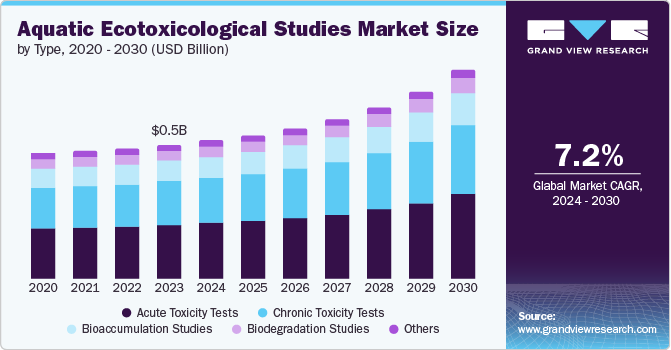
Moreover, several government regulatory bodies are increasing their emphasis on protecting water ecosystems or bodies from chemical substances, further contributing to the market growth. For instance, according to the revised State Policy for Water Quality Control Provisions by the California Environmental Protection Agency in October 2021, the regulatory provisions for chronic toxicity tests are laid down, such as the use of one or more test species, use of U.S. EPA-approved methods, and others, to ensure the safety of aquatic ecosystems and evaluate the chronic impact of chemicals.
Likewise, the effects of emerging pollutants, such as pharmaceuticals, agrochemicals & pesticides, and biocide products, have led to rising research activities for their impact on aquatic ecosystems, further fueling the market growth. For instance, the European Biocidal Products Regulation (BPR) emphasizes that biocide products undergo aquatic ecotoxicological studies with certain conditions, such as measuring the stability and solubility of a substance in a test medium and others. The increasing focus on aquatic ecotoxicology in the biocides industry is anticipated to drive the market.
Market Concentration & Characteristics
The aquatic ecotoxicology studies market growth stage is medium, and the market growth is accelerating. The market is characterized by the level of M&A activities, the degree of innovation, the impact of regulations, product expansions, and regional expansions.
Theaquatic ecotoxicology studies product categories have observed advancements in testing methods due to automation and data analysis tools that have improved efficiency and accuracy in ecotoxicology studies.
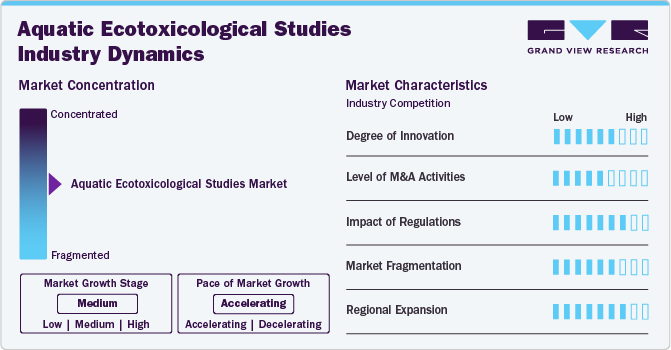
Regulatory bodies and other authorities can influence the aquatic ecotoxicology studies market. These regulations support safe aquatic ecosystems and reduce their environmental footprint.
Aquatic ecotoxicology studies have proven to facilitate firms' gains or retention of leadership or help in international expansion.
Rising expansions, increasing R&D activities, and rising product adoption can positively influence market dynamics.
The increase in R&D expenditure, the existence of technologically advanced service providers, and the rising requirement for new pollutants testing fuel the market growth.
Type Insights
The acute toxicity tests segment accounted for the largest revenue share of 40.5% in 2023. These tests determine the short-term or immediate of a chemical substance on the aquatic organism with their short-term exposure of fish to a series of chemical concentrations. The various regulatory agencies such as the European Union (EU), Environmental Protection Agency (EPA), and REACH (Registration, Evaluation, Authorization and Restriction of Chemicals) require toxicology testing for environmental safety assessment and product registration. Moreover, several organizations lay down specific test guidelines, such as OECD 203, to examine the acute toxicity in fish and other aquatic organisms, which has increased the importance of these tests for the end users.
These tests play a crucial role in identifying the potential risk of chemical substances in aquatic ecosystems, ensuring the safety of their use for the environment. This attribute of the acute toxicology tests is expected to contribute to their growth. Similarly, product registration and marketing companies are inclined towards these tests as they can be leveraged to demonstrate the safety of their products in their marketing strategies. Such factors are anticipated to drive the market.
In 2023, the chronic toxicity tests segment is anticipated to grow at the fastest CAGR of 7.4% over the forecast period. Chronic toxicity tests are designed to examine the potential risk of a chemical substance on aquatic organisms, including growth rates, survival rates, and reproduction over an extended period, typically spanning over a week or more. Increasing environmental awareness and regular reforms in regulatory compliance are the major factors increasing the importance of chronic toxicity tests. This is expected to drive the market over the forecast period.
End-use Insights
In 2023, the pharmaceuticals segment accounted for the largest revenue share of 39.4% in the aquatic ecotoxicology studies market. Furthermore, pharmaceuticals are further classified into human medicine and veterinary medicine. In pharmaceuticals, the human medicine segment held the largest market share in 2023. Pharmaceutical companies are conducting aquatic ecotoxicological studies to ensure compliance with environmental regulations. The demand for these studies is driven by the need for more comprehensive assessments of pharmaceutical impacts and regulatory compliance. As the global ecotoxicological studies market grows, the demand for aquatic ecotoxicological studies in the pharmaceutical segment is further expected to increase. Furthermore, rising global demand for pharmaceutical products has significantly increased owing to the growing burden of diseases, leading to the development of new medicines. Such factors are anticipated to drive the market over the estimated period.
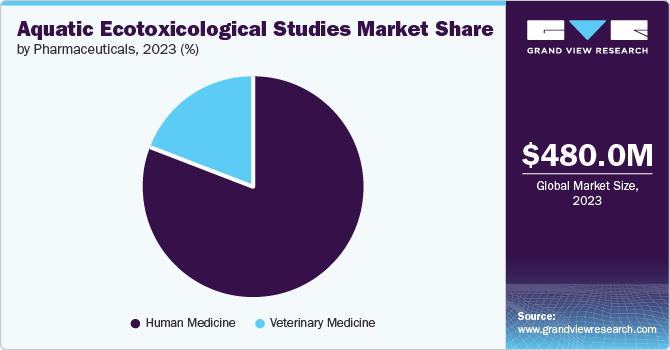
On the other hand, the agrochemicals segment is anticipated to grow at a CAGR of 7.4% over the forecast period. The agrochemicals segment assesses the impact of agricultural pesticides and industrial chemicals on aquatic ecosystems. These chemicals primarily include herbicides, fungicides, insecticides, and other pesticides, typically used to control pests, diseases, and weeds in agricultural and industrial settings. Aquatic ecotoxicology studies can significantly help agrochemical companies in regulatory submissions, which has increased their popularity in the industry.
Moreover, agrochemical companies are significantly trying to develop formulations and solutions with less threat and adverse impact on environmental entities. Aquatic ecotoxicological studies are crucial to evaluating the safety of these newly developed formulations on aquatic life before their widespread use.
Regional Insights
The North America aquatic ecotoxicological studies market is driven by the presence of established market players, implementation efforts by the government and evolving regulatory scenarios. The Environmental Protection Agency (EPA) in the U.S. and Environment Canada set the standards for aquatic ecotoxicity testing in North America. These regulations are becoming increasingly stringent, demanding more comprehensive testing for pesticides, pharmaceuticals, and various industrial chemicals. Similarly, the increasing public awareness of the environmental impact of chemicals and government focus on environmental safety are pushing industries to adopt aquatic ecotoxicology testing to ensure the environmental safety of their products or chemical compounds.
U.S. Aquatic Ecotoxicological Studies Market Trends
The U.S. accounts for the highest share of the North America aquatic ecotoxicological studies market, owing to the presence of established market players, increasing environmental awareness, increasing concerns about the safety of water bodies, and regulatory compliance. The U.S. has a significant number of market players offering comprehensive aquatic ecotoxicological testing services to various industries. This significant presence of local testing services providers has significantly contributed to an increase in the adoption of these studies across different industries and different sizes of market players.
The aquatic ecotoxicological studies market in Canada is driven by the increasing awareness about the safety of water bodies such as rivers, lakes, ponds and other water resources and the regulatory efforts to increase the adoption of aquatic ecosystem-friendly practices by various industries. There is a significant rise in the initiatives and efforts of the government to ensure the safety of water bodies from toxic substances released by various industries. This has also led to regulatory actions on the companies causing damage to the water bodies. For instance, in January 2023, Teck Metals, a mining company, was fined around 2.2 million USD for discharging pollutants from its operations in the Columbia River in February 2019. Such regulatory actions for releasing contaminants in the water bodies are anticipated to increase the adoption of aquatic ecotoxicological studies and drive market growth.
Europe Aquatic Ecotoxicological Studies Market Trends
Europe accounted for the largest share of 32.5% of the global aquatic ecotoxicological studies market in 2023. The market in the region is driven by regulatory bodies' increasing emphasis on assessing the accumulation of pollutants within aquatic organisms. An increasing focus on environmental safety is expected to drive market growth over the forecast period. Moreover, several regulatory bodies are increasingly emphasizing ecotoxicological studies for the biocide industry. Furthermore, the growing adoption of advanced testing methods in the region further contributes to market growth.
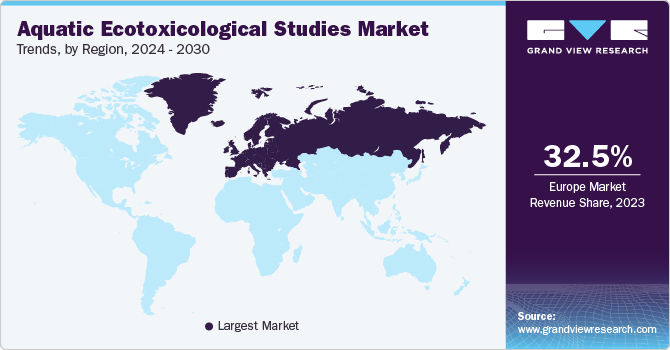
Germany aquatic ecotoxicological studies market accounts for the highest share in the Europe, owing to growing interest in new and innovative testing tools products, which is expected to boost the market demand further. Besides growing research activities, strong cost-efficiency offered by companies is contributing to its prominence in this field. In addition, demand for various product categories and increasing product innovation & technological expertise in the country fuels the market growth.
The aquatic ecotoxicological studies market in the UK is driven by increasing awareness, technological advancements, growing demand for cost-effective product categories, and rising regulatory efforts that are anticipated to fuel the market. Such factors are anticipated to drive market growth.
Asia Pacific Aquatic Ecotoxicological Studies Market Trends
Asia Pacific is expected to grow at a CAGR of 7.4% during the forecast period. The increasing industrialization and the evolving regulatory scenario for environmental safety in the emerging economies in the region drive the aquatic ecotoxicological studies market in the Asia Pacific. Moreover, a significant increase in awareness about the impact of chemical substances on water bodies and aquatic ecosystems in public is significantly encouraging companies to ensure environmental safety. Furthermore, increasing awareness among the general public about the importance of aquatic ecosystems is contributing to the market growth in the region.
The aquatic ecotoxicological studies market in Japan is driven by the government's efforts to increase the adoption of aquatic ecotoxicity tests and stringent regulatory frameworks for aquatic ecotoxicological studies. The Japanese government is taking significant steps to standardize the aquatic ecotoxicological testing in the country. The government ensured the adoption of OECD guidelines for the testing of chemicals and instituted a GLP compliance monitoring program to ensure the standards of testing laboratories. Moreover, the GLP compliance of test facilities needs to be reviewed every three years. Such stringent regulatory frameworks to ensure regulatory compliance by service providers and control industrial chemical toxicity are driving the market growth in Japan.
China aquatic ecotoxicological studies market is driven by the increasing industrialization of the country and the growing focus on regulatory compliance to ensure the safety of water bodies from industrial hazards. China has grown significantly in its pharmaceutical, chemical, and agriculture industries. Similarly, the government has increased its focus on these industries to ensure compliance with a regulatory framework such as chemical use and production, wastewater discharge, and environmental impact assessments. This is increasing the importance of regulatory compliance and, thus, aquatic ecotoxicology for the companies operating in industries with potential threats to aquatic ecosystems, thereby driving market growth.
Aquatic ecotoxicological studies market in India is driven by the increasing awareness about the impact of industrial chemical compounds on the aquatic ecosystem and government efforts to increase the adoption of sustainable practices by various industries. Moreover, the increasing regulatory changes to ensure the safety of water bodies from hazardous chemicals from various industries are further expected to drive market growth in India. For instance, in February 2024, The Water (Prevention and Control of Pollution) Amendment Bill was passed in India, reforming the previous regulatory laws. This act established the Central Pollution Control Board (CPCB) and State Pollution Control Boards (SPCBs) to control and prevent water pollution in the country. Moreover, the act complies with prior permission to establish any industrial or treatment plant near water bodies. Adopting such stringent regulation and increasing importance to aquatic ecosystems is expected to drive the market growth over the forecast period.
Key Aquatic Ecotoxicological Studies Company Insights
The key market players implement several strategic initiatives, such as expansion, acquisitions, partnerships and agreements, collaborations, etc., to increase market presence and gain a competitive edge, driving market growth.
Key Aquatic Ecotoxicological Studies Companies:
The following are the leading companies in the aquatic ecotoxicological studies market. These companies collectively hold the largest market share and dictate industry trends.
- Charles River Laboratories, Inc.
- SGS SA
- Laboratory Corporation of America Holdings
- Smithers
- Aragen Life Sciences Pvt. Ltd.
- Fera Science Limited
- Noack Laboratorien GmbH
- Eurofins Agroscience Services Group
- ibacon GmbH
- BRF (Bioscience Research Foundation)
- Toxi-Coop Ltd.
Recent Developments
-
In October 2022, Charles River Laboratories, Inc. announced the establishment of six new ecotoxicology-dedicated laboratories and expanded its facilities in the Netherlands to address the increasing demand. The newly added facilities include a custom-designed fish culture system for chronic and acute aquatic ecotoxicology studies.
-
In September 2021, IEH Laboratories & Consulting Group announced the acquisition of AquaTox Testing & Consulting Inc., a Canada-based ecotoxicity testing services provider for various industries. AquaTox offers marine aquatic freshwater and terrestrial toxicology testing through its GLP-compliant facility.
Aquatic Ecotoxicological Studies Market Report Scope
Report Attribute
Details
Market size value in 2024
USD 495.7 million
Revenue forecast in 2030
USD 750.9 million
Growth rate
CAGR of 7.2% from 2024 to 2030
Historical data
2018 - 2023
Forecast period
2024 - 2030
Quantitative units
Revenue in USD million/billion, and CAGR from 2024 to 2030
Report coverage
Revenue forecast, company ranking, competitive landscape, growth factors, and trends
Segments covered
Type, end-use, region
Country scope
U.S.; Canada; Mexico, UK; Germany; France; Italy; Spain; Denmark; Sweden; Norway; Netherlands; Switzerland; Japan; China; India; Australia; South Korea; Thailand; Brazil; Argentina; South Africa; Saudi Arabia; UAE; Kuwait
Key companies profiled
Charles River Laboratories, Inc.; SGS SA; Laboratory Corporation of America Holdings; Smithers; Aragen Life Sciences Pvt. Ltd.; Fera Science Limited; Noack Laboratorien GmbH; Eurofins Agroscience Services Group; ibacon GmbH; BRF (Bioscience Research Foundation); Toxi-Coop Ltd.
Customization scope
Free report customization (equivalent up to 8 analyst’s working days) with purchase. Addition or alteration to country, regional & segment scope.
Pricing and purchase options
Avail customized purchase options to meet your exact research needs. Explore purchase options
Global Aquatic Ecotoxicological Studies Market Report Segmentation
This report forecasts revenue growth at the regional, and country levels and provides an analysis of the latest industry trends in each of the sub-segments from 2018 to 2030. For this study, Grand View Research has segmented the global aquatic ecotoxicological studies market report based on type, end-use, and region:
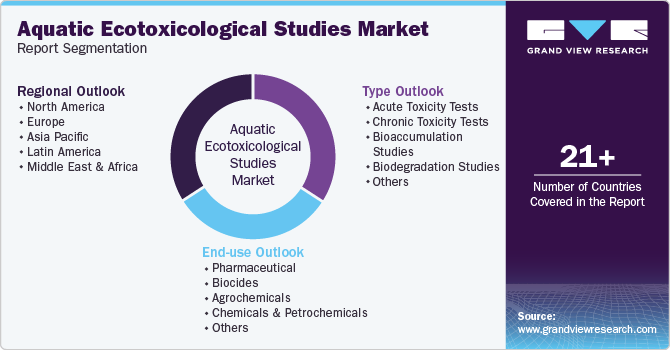
-
Type Outlook (Revenue, USD Million, 2018 - 2030)
-
Acute Toxicity Tests
-
Chronic Toxicity Tests
-
Bioaccumulation Studies
-
Biodegradation Studies
-
Others
-
-
End-use Outlook (Revenue, USD Million, 2018 - 2030)
-
Pharmaceutical
-
Human Medicine
-
Veterinary Medicine
-
-
Biocides
-
Agrochemicals
-
Chemicals and Petrochemicals
-
Others
-
-
Regional Outlook (Revenue, USD Million, 2018 - 2030)
-
North America
-
U.S.
-
Canada
-
Mexico
-
-
Europe
-
UK
-
Germany
-
France
-
Italy
-
Spain
-
Denmark
-
Sweden
-
Norway
-
Netherlands
-
Switzerland
-
-
Asia Pacific
-
Japan
-
China
-
India
-
Australia
-
South Korea
-
Thailand
-
-
Latin America
-
Brazil
-
Argentina
-
-
Middle East & Africa
-
South Africa
-
Saudi Arabia
-
UAE
-
Kuwait
-
-
Frequently Asked Questions About This Report
b. The global aquatic ecotoxicological studies market size was estimated at USD 0.48 billion in 2023 and is expected to reach USD 0.50 billion in 2024.
b. The global aquatic ecotoxicological studies market is expected to grow at a compound annual growth rate of 7.17% from 2024 to 2030 to reach USD 0.75 billion by 2030.
b. The acute toxicity tests segment dominated the aquatic ecotoxicological studies market in 2023 with a market share of 40.53%. These tests play a crucial role in identifying the potential risk of the chemical substances to the aquatic ecosystems, ensuring the safety of their use for the environment.
b. Some key players operating in the aquatic ecotoxicological studies market include Charles River Laboratories, Inc., SGS SA, Laboratory Corporation of America Holdings, Smithers, Aragen Life Sciences Pvt. Ltd., Fera Science Limited, Noack Laboratorien GmbH, Eurofins Agroscience Services Group, ibacon GmbH, BRF (Bioscience Research Foundation), Toxi-Coop Ltd. and others.
b. Rising environmental awareness, potential risks of toxic substances to aquatic organisms, and the increasing need for ecotoxicological studies to identify and assess environmental risks are key growth drivers for this market. Moreover, the growing trend towards an increase in the adoption of these studies across different industries further supports the market's growth.
Share this report with your colleague or friend.
Need a Tailored Report?
Customize this report to your needs — add regions, segments, or data points, with 20% free customization.

ISO 9001:2015 & 27001:2022 Certified
We are GDPR and CCPA compliant! Your transaction & personal information is safe and secure. For more details, please read our privacy policy.
Trusted market insights - try a free sample
See how our reports are structured and why industry leaders rely on Grand View Research. Get a free sample or ask us to tailor this report to your needs.










